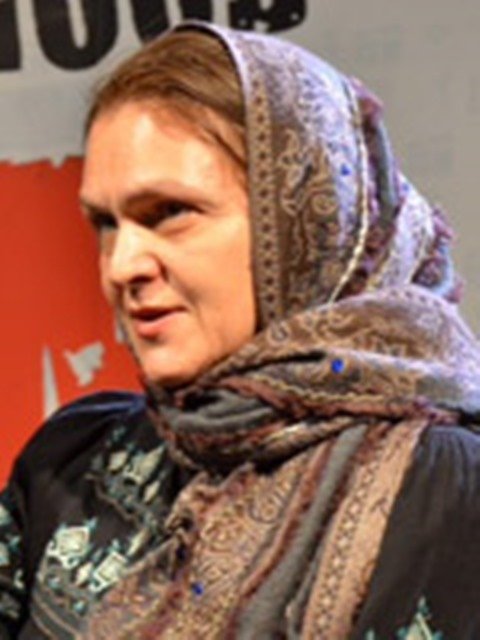Jerusalem: Witnessing the death of Palestinian trade
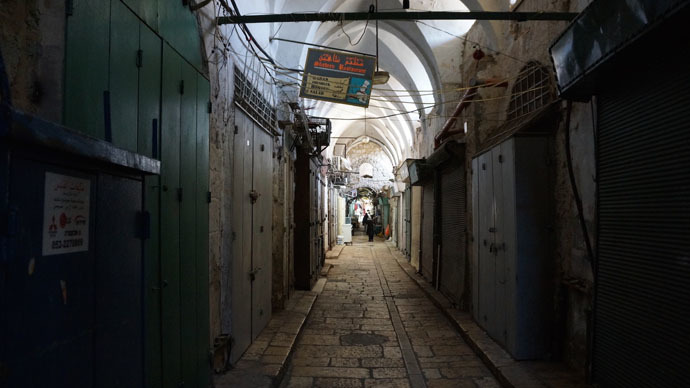
To have a shop in the Old City of Jerusalem is kind of a mission aimed at promoting Palestinian presence. No trade – no Palestinians. It’s another aspect of the slow but incessant de-Palestinization which affects every Arab living here.
Any tourist to Jerusalem can witness the brisk trade of souvenirs near the holy shrines of the Old City and not usually give it a second thought. But just 30 years ago this was a real living city with small shops selling all kinds of goods. The average tourist knows nothing about the lengths Palestinians have to go to in order to keep the shops their fathers opened.
On Mondays, grocery stores are usually closed. But I come here daily and there are no lines and no crowds of buyers here either.
“Our trade is in decline,” says Mohammed Sherif, aged 52 and a father of 12. His bicycle shop is quite close to Al-Aqsa Mosque. He opens it at 4am as people are heading for the first morning prayer. All other nearby shops are closed, except for two.
Tax on handcart & chickens
Trade is a blessed and worthy occupation with Muslims. Even the Prophet Mohammed had been in trade before the Koran was sent to him as a revelation. Apart from that, trade is an important way of maintaining Palestinian presence in Jerusalem.
“At the airport guides instruct tourists where it is better to buy goods. Some time ago people used to buy even school backpacks in the Old City, but today there is no space to park a car, some people can’t even get here, let alone make some shopping for the family,” he says.
Mohammed’s son also works in the shop.
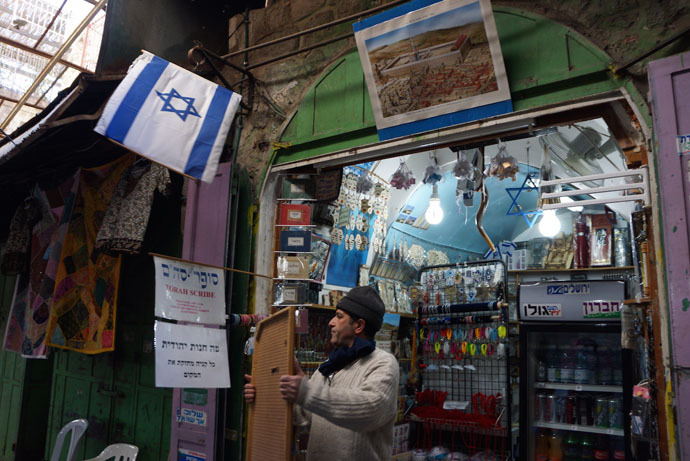
“A friend of mine had a similar shop and my son used to work there. He dreamed that he would grow up and open a bicycle shop himself. Bicycles are popular here, especially in the Old City, and they all need regular maintenance and a change of parts. But that shop closed down,” says Mohammed.
“Most of us are unemployed. Without a job, you don’t have the money to buy goods and keep the shop running. Israel’s policy is to push our trade out of the Old City,” he adds.
The monthly tax on a shop is worth 500 shekels (US$129).
“Many owners can’t afford to pay such a high sum and so they have to shut their shops down. Look at the row of closed shops,” and Mohammed goes on to name his neighbors who were forced to abandon trade.
The story of his family is typical for a Palestinian in Jerusalem. He was born in al-Khalil, or Hebron, before the occupation of the West bank by Israel in 1967. Prior to that, both al-Khalil and Jerusalem were controlled by Jordan.
His wife is from Jerusalem. He is lucky to be recognized as a temporary resident of Jerusalem so he has the permission to stay here. But he is welcome only as long as his tax payments are on time.
“To extend my ID, I have to provide all the papers and stubs, including energy bills,” he explains.
But if trade winds down, he won’t be able to pay taxes and his bills, and he and his family are going to lose the right to live in Jerusalem. His wife will be no exception.
“My family is now divided between the West bank and Jerusalem. My daughter got married to a man on the West Bank. We cannot come over to live here,” says Mohammed.
His wife spent eight years working as a scrubwoman in a school but now the mother of 12 children doesn’t have the capacity any longer.
“I am the only breadwinner.”
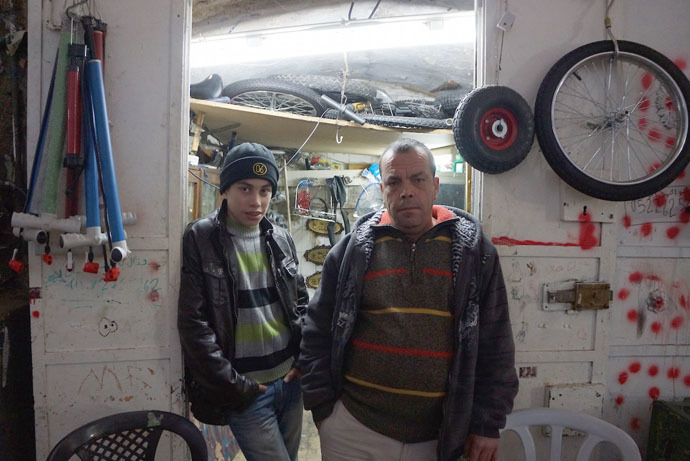
Like many Palestinians, he would be happy to take up every opportunity to earn money. For instance, he’s got a handcart which can be used to transport goods for other traders along the narrow streets of the Old City where traffic is not allowed. But you need permission for the handcart which is quite costly. He doesn’t have the paper. First, it’s difficult to get. Second, it’s not really worth the effort. It costs more than he earns. Trade is on the decline so with time there will be fewer requests where the handcart could be used. To make things worse, he doesn’t have a place to hide the cart, either.
“If they noticed the cart, I would have to pay a fine since I don’t have permission for it. They say it’s too busy on the streets and my cart stands in the way. But there’s not alternative to a cart for merchants in the Old City. A car is too large to squeeze in here,” says Mohammed.
“There must be permission for everything, even for camels and chickens. It’s not a joke. It’s a rule,” he says.
His children have been arrested multiple times.
“The seven-year-old was apprehended three years ago. They came to our house and questioned him. We were not allowed to stay in the room. It’s strange because he had top marks at school. They wanted to know who threw stones in the street,” says Mohammed. By ‘they’ he means the Israeli Army.
One of the sons, Ahmad, 16, goes to school. “I want to become a mechanic, to do things with my own hands,” he says.
When the father went out, Ahmad told me Mohammed was seriously ill. “He has lung problems and needs special treatment, so I need to get an education and feed the family.”
He says that his sister is soon to get married. She is 18. Another sister got married at 15.
He doesn’t want to set up a family for himself, though.
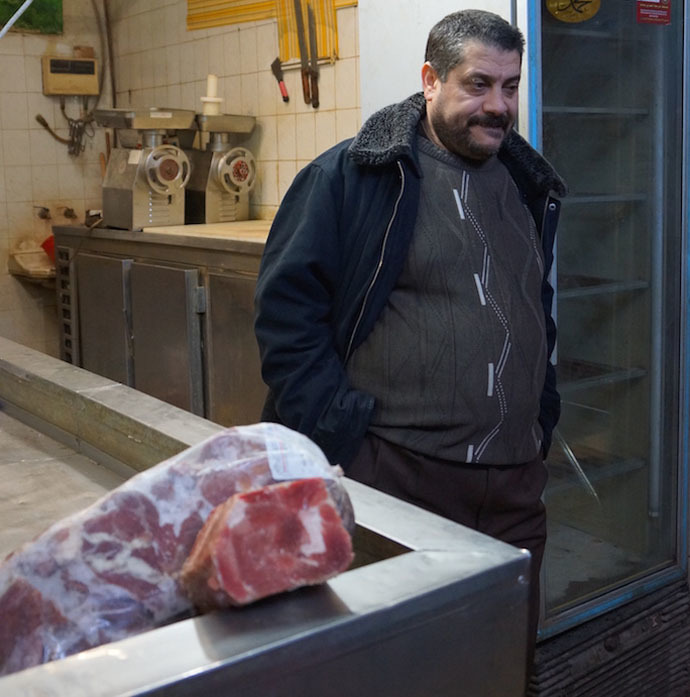
“We don’t have the money for the wedding. I need to provide for my family, for my parents. I am saving, little by little, for the wedding”. According to the Sharia law, Ahmad needs to present a mahr, or man’s dowry, to the bride.
But Ahmad doesn’t give up.
“I have the ID. I went to Western Jerusalem to look for a job. So far I only earned 250 shekels in a week’s time. Also, I worked as a cleaner for eight hours in a restaurant of one Christian Palestinian but today the Old City is quiet – no tourists, no job, no money,” says the boy.
Notwithstanding his young age, he’s gone through many things that would be difficult even for adults.
Over the 16 years of his life he’s been arrested seven times.
“We were arrested for the first time when we made a fire on the hill. The police said we wanted to throw stones. Twelve children were held in one cell for 15 hours. We were not allowed to go to the lavatory. Instead, they gave us plastic bags,” he shares his story.
“I don’t have any Jewish friends, and I don’t know anyone who has”
Osama Maatuk, 51, had five children. He was born in Jerusalem.
“I was born in the Old City. We live in Shufat, near Beit Hanina. We own a house, so we have to pay an annual tax of 13,000 shekels [$3,360] for it, which is a lot for us. We work hard to be able to afford paying this tax”, says Osama.
He works in a butcher shop with his brothers.
“We inherited this shop from our father. We have to pay 300 shekels for it monthly. Look at the market: it’s empty. And just some 30 years ago, there were lots of people here, and the trade was brisk. So you’re looking at the ethnic cleansing of al Quds [Jerusalem] getting rid of Palestinians,” explains Osama.
On top of the common Palestinian issue, each family has its own problems. Most often it’s health-related problems of someone in the family; whereas healthcare is very expensive for Palestinians.
“My son, 10, has diabetes. We get 1,000 shekels from his insurance, so at least there’s some money to help care for him,” comments Osama.
In his family, his brother was the only one who got arrested for throwing stones at soldiers during the first intifada in the late 1980s. He was then imprisoned for eight years.
“The rest of our family had never been in jail,” says Osama. You can say this is a happy family that got lucky. Usually, most children and adults have been behind bars.
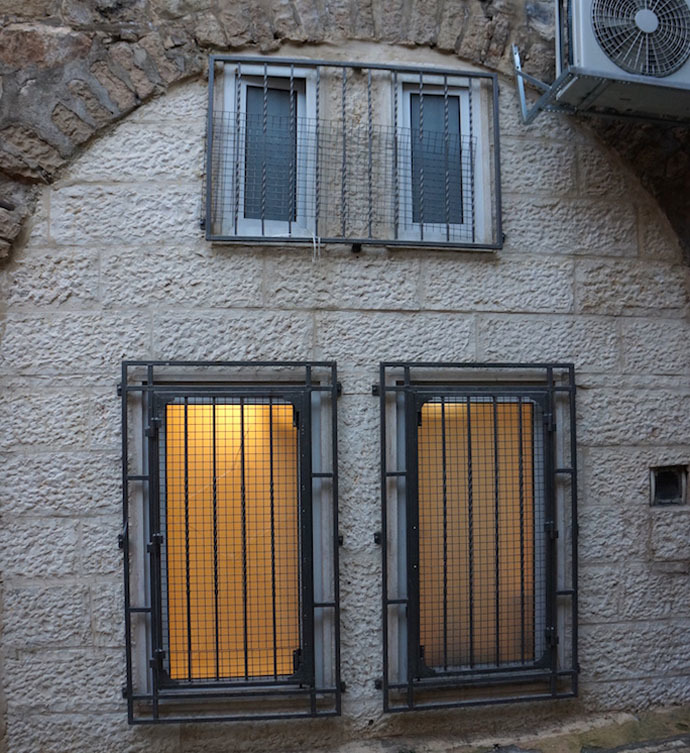
“We hope the situation will change. You’re asking whether we want one state or two states? We cannot make this decision; but in the overall we are for the Palestinian state,” he adds.
The idea of the two states seems dead to Palestinians. Gaza has been cut off from the West Bank, without any communication. And the West Bank is a bunch or small sectors that are cut off from each other by Israeli checkpoints, which makes going from one village to another just as difficult for Palestinians as getting from Bethlehem to Jerusalem.
Osama recalls the times before the foundation of Israel which he remembers from stories by his grandparents:
“There were a few Jews living here. They didn’t do any harm, they didn’t take over any lands; they were the minority."
“I don’t have any Jewish friends, and I don’t know anyone who has,” he observes. He doesn’t understand how make friends with those who take away your home and land, and arrest your children.
“Our problems began when the extremist settlers came over. Neturei Karta [the Jewish religious organization that opposes the state of Israel] always supported Palestinians,” he explains.
The shop generates at least some profit for the family. At times, they make up to 2,000 shekels a month.
They sell frozen rather than fresh meat.
“This is halal meat from Brazil,” Osama shows his scarce stock. He is upset that he cannot sell fresh meat, the way it should be. Whatever’s on the counter should be sold by tonight. “Few shops are open on Mondays. Having a fridge means we can stock up. Many sell frozen meat from Israel. Fresh meat is only available in the West Bank, but we cannot bring it from there, so we sell frozen meat only in Jerusalem."
“When Jews butcher their cattle they say the name of Allah, therefore we are allowed to eat it,” Osama explains why Palestinians sell and buy Israeli food. Actually they don’t have much choice in the matter, as they even have to buy imported goods from Israeli middlemen.
As many Palestinians in Jerusalem, he inherited his shop from his grandfather, who had established trade when Jerusalem was in Jordan’s control.
He doesn’t know a single Palestinian who had managed to buy a shop or a house in Jerusalem since the occupation; to the contrary, many of them lost their businesses. If you walk along old shopping streets you come across numerous buildings that were transformed from shops into settlers’ homes. You’d never confuse the buildings seized by settlers, as each of them sports an Israeli flag on top.
“There are those who sell out of desperation, or greed. They make a lot of money, and leave for good as a rule. They cannot buy anything new in Jerusalem, like a shop or a house. Some Palestinians are like that; but why should we talk about them?” Osama turns sour.
I stop at an unusual souvenir shop near the Wailing Wall. It features the same style as other Palestinian buildings. However it’s owned by an Israeli rather than a Palestinian – something you don’t find often in East Jerusalem.
He just opened his shop. He holds a large Israeli flag, and his stock boasts Israeli, rather than Palestinian, goods. He declined to talk about the cost or the revenues of the shop or when he bought it. But he is ready to talk at length about Israel. He says it’s the land of Jews. He greets the guides who bring tourists to buy souvenirs here.
I take to busier streets as I look for Palestinian merchants.
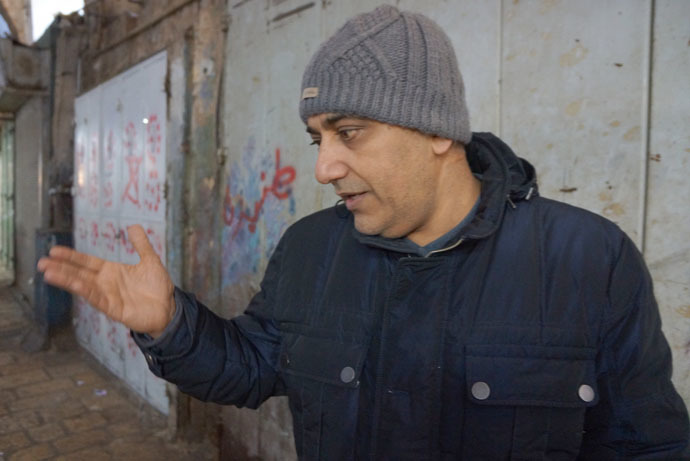
I see a man with big bags come up to me. He’s well known in these places. Harut, 50, is Armenian by origin. His predecessors came to Jerusalem a hundred years ago. He lives in the Old City, in the Armenian district, and owns a restaurant. His business is quite good.
“They ran away from the Turks. Have you heard of the genocide?” Harut asks me.
He’s got two sons. Although he never served in the army, he hopes his younger son and his grandchildren will join the Israeli Defense Forces. It’s a bit weird to hear him say this in front of other Palestinians. No-one tells him that in twenty years his grandchildren might be arresting the grandchildren of those he’s talking to right now.
Palestinians are not eligible for service, however. The only exceptions are Bedouins.
“Render unto Caesar the things that are Caesar's, and unto God the things that are God's. That’s what we Christians think. Palestinians are nice people. But we must protect ourselves from Islamic extremists. We are extremely worried. Look what they do in Syria, in France,” says Harut.
But he doesn’t really have the explanation how Islamic extremists in France can be a threat to Armenians in Jerusalem.
Harut then switches to increasingly lower numbers of Christians in Jerusalem.
“There used to be 20 percent of Christians here, not they account for less than one percent,” he says.
But he doesn’t talk too long about it. It’s not clear why there are so few Christians and who is to blame. If you really want your grandchildren to serve in the Israeli Defense Forces, you’d rather not think about it.
The statements, views and opinions expressed in this column are solely those of the author and do not necessarily represent those of RT.
The statements, views and opinions expressed in this column are solely those of the author and do not necessarily represent those of RT.
